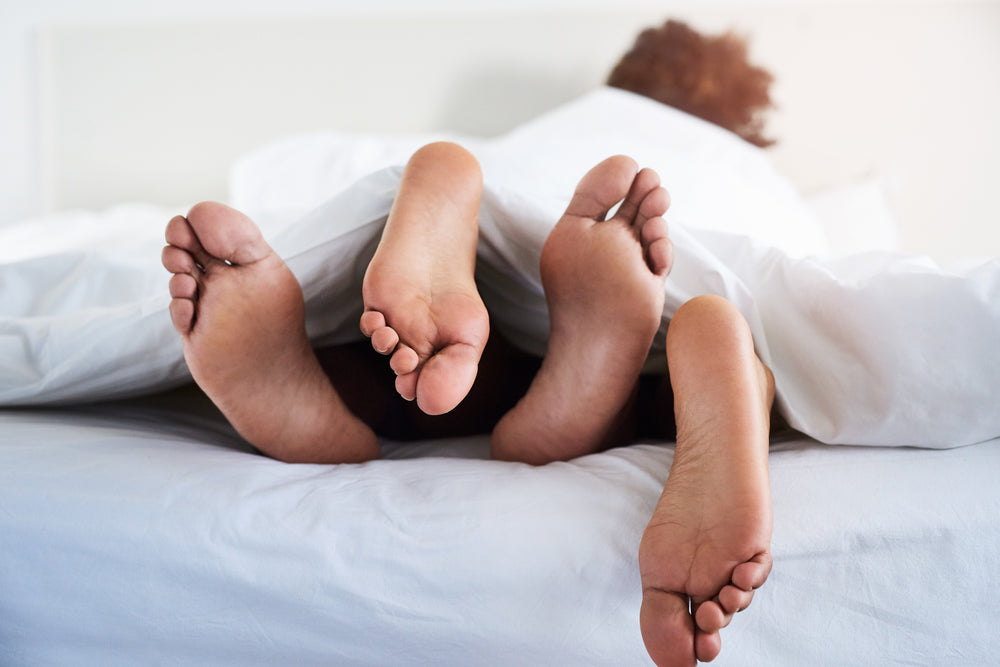It is highly probable that, even before you decided to start trying for a baby, you have come across at least one “sure way to get pregnant” or, on the contrary, seen “facts” that will prevent you from or reduce your chances of conceiving. Although well-meaning, many of these statements that reach women via word-of-mouth, the media or magazines have no evidence to support them.
The road to having a baby shouldn’t be paved with fear of ‘doing the wrong thing’ or the stress of ‘getting it right’. Although evidence-based advice on nutrition, lifestyle changes for you and him and when to have sex will all help you improve your chances of having a baby, myths surrounding these topics will do little more than worry and confuse you. So, let’s bust them!
Myths
You need to stay in bed for 30 mins and put your legs up the wall after sex - What position you adopt following intercourse makes no difference to your odds of getting pregnant. It is true that, if you get up immediately after sex, you may feel a trickle, but this is likely to consist of seminal fluids (the fluid that carries sperm) mixed with your own cervical discharge. Most of the sperm will already be making their way north through your cervix in search of an egg to fertilize!
You should have sex everyday – Although having frequent and regular sex increases your chances to conceive, there is no evidence that daily sex will lead to becoming pregnant any faster. What’s more, you run the risk of making it feel like a chore, leading to burnout, frustration and undue stress for you both. Have sex often and regularly and enjoy it.
Only have sex when you ovulate – The egg that is released from your ovary only has a 12-24 hour window in which it can be fertilized. So, to increase your chances of conceiving, it is best to have sex on the days approaching ovulation. If you wait until you think you’ve ovulated, it may be too late.
Do bear in mind, however, that not all women ovulate on, or around, the 14th day of their cycle – you may ovulate quite a lot earlier or later than this, depending on the length of your cycle and individual circumstances. This is why having sex regularly and often throughout your cycle will considerably increase your chances of getting pregnant.
The missionary position is the best for improving chances of conception – There is absolutely no evidence that this helps. In fact, no position is thought to improve or worsen your chances to get pregnant. So, feel free and opt for positions that bring you pleasure. The rest should follow.
Having an orgasm will help – By all means, have all the orgasms you can get (!), but don’t believe this myth which is based on the idea that sperm will be ‘sucked into your cervix’ when you orgasm. There is no evidence of this.
Birth control/contraception will reduce my fertility – Rest assured that this is not the case. Because most methods of birth control induce an artificial, regular cycle, once you come off them you may think that your periods have become irregular. However, irregular or ‘less-regular’ periods may just be your natural cycle. Saying this, it is true that Depo-provera (the contraceptive injection) has longer lasting effects that may cause temporary infertility. Once all the extra progesterone from the injection is eliminated from your body, your fertility will return – with most women conceiving within 10 months of stopping the injections.
Lubricants will help you get pregnant – Well, that depends… Water-based lubricants may actually hinder the movement of sperm by more than 60% and, thus, significantly reduce your chances of becoming pregnant. However, some oil-based lubricants (like canola or mustard oil, for example) are thought to be safe to use during sex when trying to conceive.
You won’t get pregnant if you have sex during your period – Actually, you can get pregnant during your period. If your cycles are short, you may ovulate 7-8 days following the start of your period and, because sperm can live inside you for up to a week, there is a chance that sex during your period could lead to pregnancy.
Summary
When it comes to having babies, you want to make sure that the advice you follow is sound and backed by evidence. Myths surrounding the do’s and don’ts of sex when trying for a baby abound and choosing what to believe can be a slippery slope to confusion and stress. We have busted some of the most common myths about sex when trying to get pregnant, so that the start of your journey into parenthood can be as clear and stress-free as possible.


















